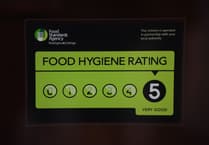Sir Salman Rushdie, who is said to be on the ‘road to recovery’ after being stabbed while preparing to appear at a literary event in New York state last week, famously hid out in the Powys countryside while in ‘internal exile’ in the 1980s.
The author’s 1988 novel the Satanic Verses, which reimagined parts of the Prophet Muhammad’s life, led to Iran’s Ayatollah Khomeini to issue a fatwa - a death sentence - against him, forcing him to seek sanctuary in a number of safe houses including some in Brecon and Radnorshire.
In his 2012 book Joseph Anton, a Memoir, Sir Salman revealed that he spent part of his time in ‘internal exile’ hiding out in the Brecon Beacons starting his time at a remote farm house owned by his former agent Deborah Rogers.
Adopting the pseudonym Joseph Anton - taken from this favourite writers Joseph Conrad and Anton Chekov, he moved to Powys after security forces agreed he was unlike to be traced to the remote property.
In addition to the Powys farm Sir Salman revealed that he had used other ‘safe houses’ in Wales including a bed and breakfast establishment run by a former police officer and had enjoyed ‘secret’ visits to friends like former Labour leaders Neil Kinnock and Michael Foot and writers Ian McEwan, Hanif Kureishi and Martin Amis.
“It was up to me to find the houses, places the police would approve of. It was just very cooped up. When I wanted a walk, they would have to take me,” he wrote, adding that police officers accompanied him everywhere, even to the lavatory, but he had declined to wear a wig as a disguise.
Writing in the Los Angeles Times in 1990 Sir Salman’s former wife Marianne Wiggins, to whom he was married at the start of his exile, recalled her time, ‘on the lam in Wales’ saying that there was, “a darkness, dead as coal, behind the windows of the houses”.
“Sheep are the common stock,” she wrote, adding that it seemed that “great tracts of Wales are designated by Great Britain solely for the practice of war games…”
In a frank article she spoke about the strain of living in exile and her fear of being recognised as the wife of a marked man.
“I thought the woman in the health-food store in the market town I shopped in had recognized me, owing to the way she stared at me. But the people with whom we have to live now told me that she stared at me, most likely, because I have an accent,” she wrote.
It’s believed that the family’s second Powys house brought them closer to Brecon, a town Wiggins describes in detail having spent time at its market.
“Brecon is a market town. At the Brecon market, there are barren cows, fat bulls, fat ewes, fat hoggets, weaned calves, breeding cows, bulling heifers, cull bulls, pedigree beef bulls and rams. I learned this by reading local papers,” she wrote, adding that her favourite local paper was the Brecon and Radnor Express.
“The local paper that I looked forward to the most was published every week on Thursdays. Thursdays, then, held definite excitement. The paper cost 24 pence. No other journal—not El Pais or Applausos or The Observer—was more eagerly awaited by me than The Brecon-Radnor Express & Powys County Times, 16 pages every week. It was through that paper that I learned location, began to find out about where I was and who the people were that sometimes passed me on the road. I was not allowed to hold a conversation with a stranger.
Once a month, The Brecon-Radnor Express had a page called “W I News.” This I found out, stood for Women’s Institute. Women’s Institute was the name of a club, a service club, and hundreds of them were scattered throughout Wales.
Once a month on the “W. I.” page, I could read the reports from the clubs in the county—from Three Cocks and Llanwrtyd and Aberhonddu and Bwlch and Defynnog and Garth.
“A pleasant half-hour was spent looking at local and holiday slides taken by members, which proved to be very interesting. Japan is densely populated, but Mrs. Scutt saw no litter and found the people polite and friendly. Mrs. Ursula Pumphrey proposed a vote of thanks. . . .”
From Crickhowell: “The competition, a Valentine verse based on bread, was won by Mrs. Freda Jones.” From Builth Wells: “The competition ‘Most Artistically Folded Napkin’ was won by Mrs. Dilys Jones.” From Penderyn: “The competition ‘The Most Unusual Teapot’ was won by Mrs. Cooke.” From Llangasty: “Refreshments were served and there followed a ‘social time,’ organized by Mrs. Wendy Griffith, during which members had some fun demonstrating how ambidextrous they were.” From Garth: “The competition was for the longest apple peel.” From Defynnog: “The competition for the most unusual button was. . . .” From Glasbury: “The competition for an unusual pebble was. . . .” From Tretower: “Competition winners for the best covered coat-hanger were. . . .”
There was an article one week called “From Sheep to Shells,” about a woman in the Brecon hills who had decided that her small holding would not provide her with a decent living raising sheep, so she had sold them and invested in a 100-breeder-strong conurbation of land snails, African ones, said to be more tender and less rubbery than their North European cousins.
It was by reading this article that I learned that the African land snail gestates in four months as compared to two years for the European species, and that Eastern European snails have been contaminated ever since Chernobyl.
It was in The Brecon-Radnor Express, too, that I read that “a farmer who staggered into a neighbor’s house half-naked, covered in blue dye, with his hands and testicles bound with rubber bands, has been cleared of the charges that he planted a hoax bomb and wasted police time. . . . Stephen Gilmore Williams said that he had crossed two fences with his hands tied behind his back and his testicles bound in a rubber band, but Detective Inspector D. A. Davies of Ammanford had tried to do the same but had failed to do so.” Talk about your projects…
“I learned from the Express that there had been an increase in the incidence of arson, that Welsh Nationalists were setting fire to the summer homes owned by the English. And there was murder, too. And racial violence.”
Writing of her time in hiding in a ‘legendary place’ Wiggins wrote, “One night, watching news from elsewhere on the television, I saw the president of a bankrupt desert nation speak into a microphone while an English-accented, male voice translated his, the president’s, intent to send a black arrow of revenge from that distant desert into my husband’s heart…Warplanes fly sideways through the valleys. We wait for one aged psychopath to die...”
What happened next...
Illness and plaudits after the exile
After five months together in exile, Ms Wiggins walked out on her husband, unable to stand the strict security. The couple divorced in 1993.
In 2016 she suffered a stroke, leaving her unable to read or write. She regained those abilities and completed her novel Properties of Thirst over the course of several years.
She currently lives in Los Angeles, California, where she has been in the English department of the University of Southern California since 2005
In September 1998 Iran distanced itself decisively from the fatwa and the accompanying bounty with Iranian foreign minister Kamal Kharrazi telling the UK’s foreign secretary Robin Cook in New York that his government had “no intention” of harming Sir Salman.
In 2008 Salman Rushdie was knighted for his services to literature and in 2022 he was made a member of the Order of the Companions of Honour as part of the Queen’s Birthday Honours.
On August 12 Sir Salman Rushdie sustained ‘life changing injuries’ when he was stabbed while on stage about to give a lecture at the Chautauqua Institution - just two weeks after telling an interviewer his life was ‘very normal again’ and that fears of an attack were a thing of the past.





Comments
This article has no comments yet. Be the first to leave a comment.